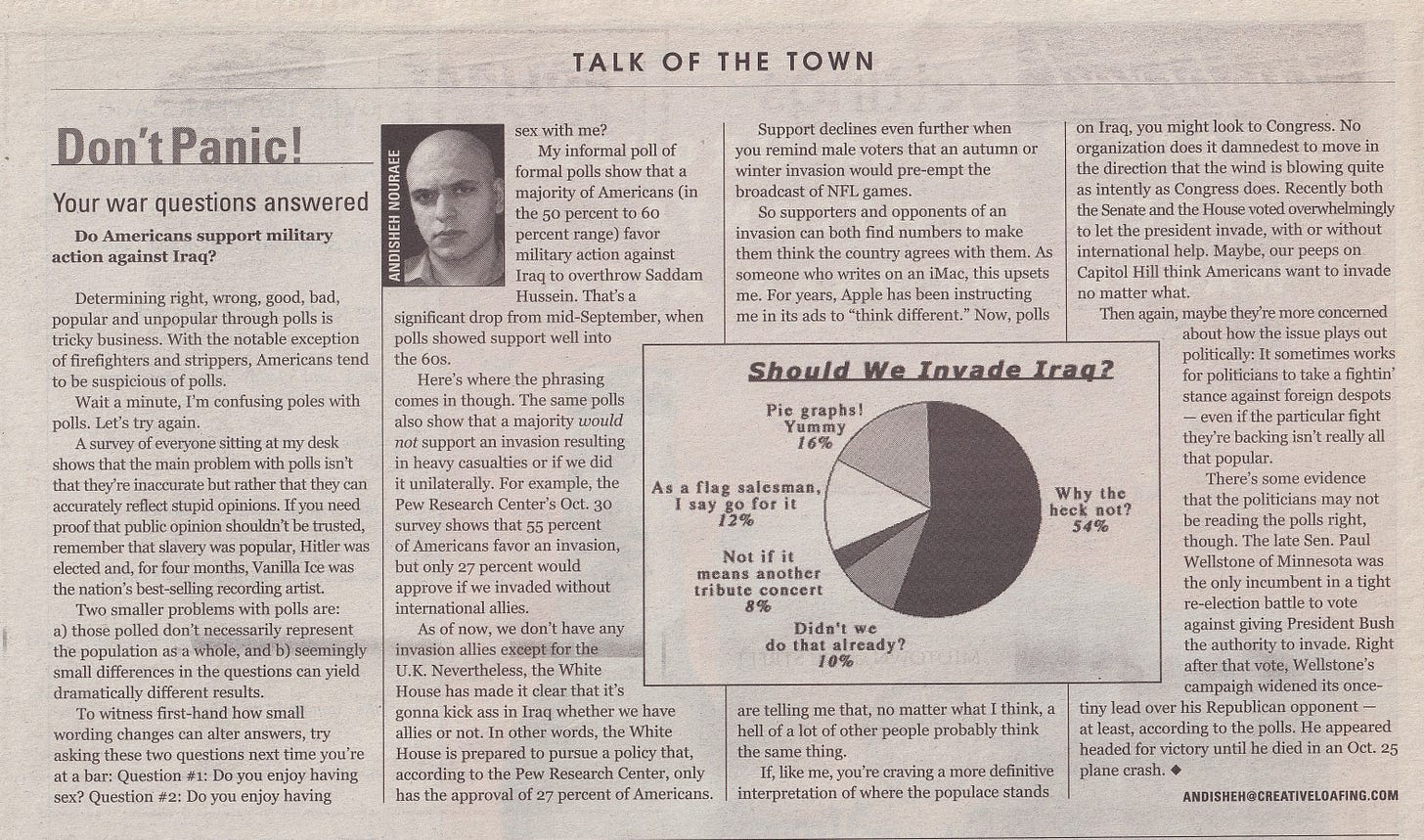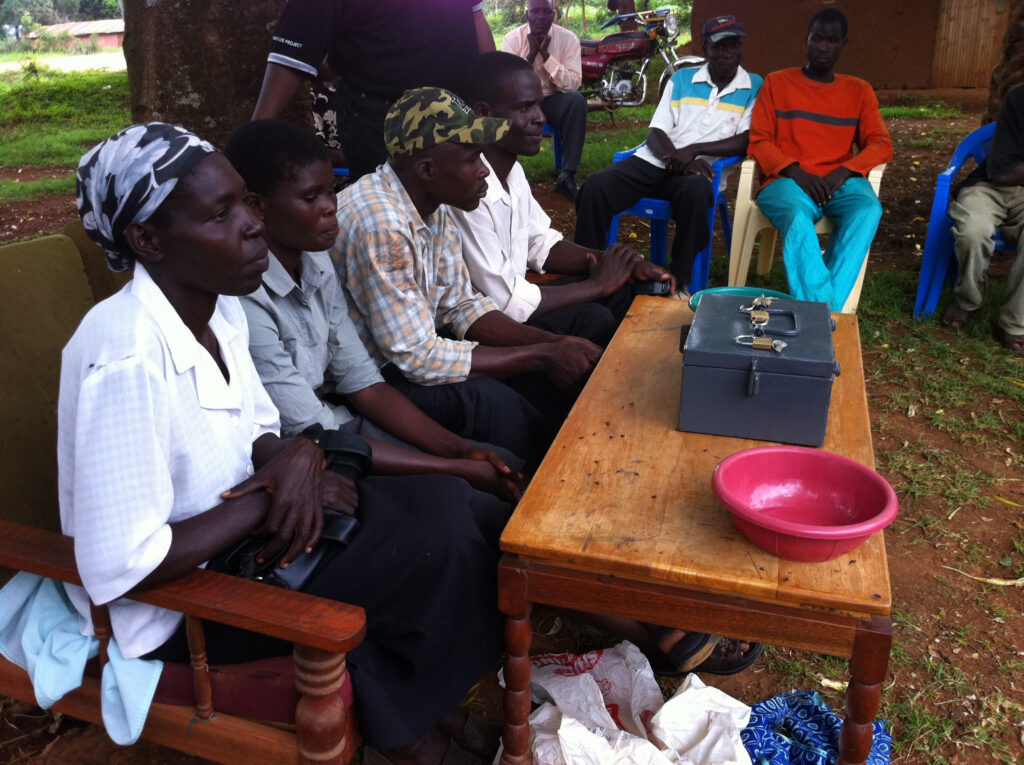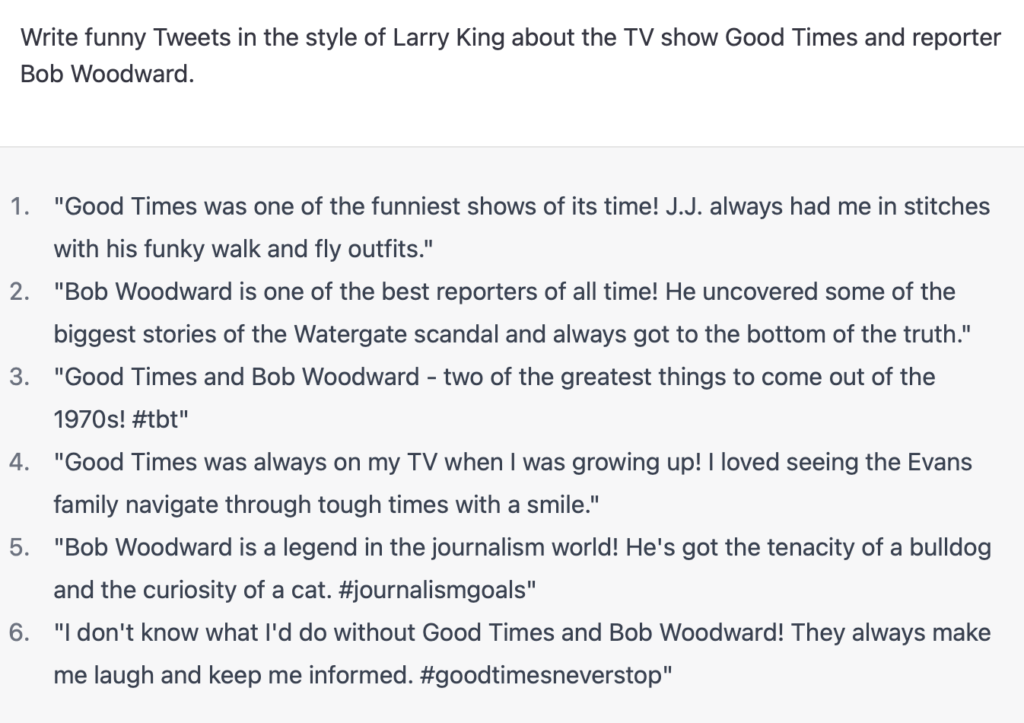I thought the Iraq war would be a catastrophe before it started (and wrote that at the time). Instead of feeling correct though, I mostly feel terribly. First, because there’s no pleasure in witnessing catastrophe. I’m a patriotic citizen of the country that’s destroying itself with its hubris, greed, bigotry and stupidity.
Secondly, when I read what I wrote about it 20 years ago I mostly think that by focusing on day-to-day, week-to-week news that I unwittingly obscuring the grand, historic nature of the catastrophe.
Some the jokes were ok though. November 2003:
So, is Iraq like Vietnam? Unfortunately, the answer is yes. Like Vietnam, the war in Iraq is an unprovoked, internationally unpopular one motivated by the ideology of a president whose last name is slang for genitalia, rather than our real defense needs.
Here’s the full essay, from November 2003:
Should gay marriage be legal? Who killed JFK? Will al-Qaeda attack American soil again? Is that really Paris Hilton in the video? These are just some of the big questions occupying American minds and fueling the shouting matches on basic cable news shows. In the past few weeks, another question has joined the list — Is Iraq another Vietnam?
A lot of people who are opposed to the war or think that its going badly are inclined to think yes, Iraq is another Vietnam. Supporters of the war typically think that it isn’t, but even some of them are noticing the parallels. President Bush has yet to directly comment on the debate, but I’m pretty sure that he doesn’t think that Iraq and Vietnam are similar. After all, Iraq is the war he started. Vietnam is the one he dodged.
To understand the debate, you have to know what Vietnam means in the context of the question. Some history — Vietnam is a New Mexico-sized country in Southeast Asia that we fought in during the ’60s and early ’70s to keep it from going Communist. Our attempt to save Vietnam included dropping more bombs on it than we dropped during all of WWII. They weren’t even the precision-guided “smart bombs” that we have today. They were regular-old gravity, wind and momentum-guided dumb bombs. These bombs were so dumb — (Chorus shouts) “How dumb were they?” — they were so dumb that they not only killed Vietnamese civilians by the tens of thousands, but quite a few missed Vietnam altogether and hit neighboring Cambodia and Laos. But hey, better dead than Red, right?
Despite the bombs and, at one point, nearly half a million U.S. soldiers deployed there, we couldn’t stop Vietnam from going Commie. We lost the war, some national dignity, and 58,000 soldiers. Hence “Vietnam” is now shorthand for “long, unpopular, poorly planned, unwinnable war that sharply divides the country, turns allies against us, and is led by an arrogant, inept and dishonest presidential administration.”
So, is Iraq like Vietnam? Unfortunately, the answer is yes. Like Vietnam, the war in Iraq is an unprovoked, internationally unpopular one motivated by the ideology of a president whose last name is slang for genitalia, rather than our real defense needs. Vietnam didn’t threaten us per se. It was a hot corner of the bigger Cold War and President Johnson wanted to fight there. Iraq didn’t threaten us. It did however stand in the way of President Bush’s desire to remake the Middle East into an American-friendly gas pump.
Also like Vietnam, the Iraq war was sold to Americans with a lie. In 1964, President Johnson got Congress to give him carte blanche to fight the Vietnam War by claiming that Communist North Vietnam attacked a U.S. naval vessel off the Vietnamese coast in the Gulf of Tonkin. Taped conversations prove that Johnson didn’t really believe the attacks had occurred. He used the alleged attack as a means to obtain war powers from Congress. Iraq’s Gulf of Tonkin-like lie was the false claim that Iraq posed a WMD threat to the United States or that it was somehow involved in the 9-11 attacks.
Like the Johnson White House during Vietnam, the Bush White House keeps spinning the war positively to suit its domestic political needs. The White House relentlessly asserts that the war is going great, while actively suppressing bad or sad news — such as preventing the media from photographing the coffins of dead returning soldiers. Like the “Pentagon Papers” leaked during Vietnam that told Americans what the government really thought of the war, it’s only through leaks that we’re finding out what the Bush administration thinks of this war (example: the leaked October memo in which Rumsfeld calls the Iraq war “a long, hard slog” and admitted that he has no way of knowing whether we’re winning or losing the War On Terror .)
Like the Johnson folk, the Bush people went into Iraq believing that American military might trumped all other considerations. Our inability to quell Iraqi resistance proves otherwise. We can win the military battles, but we’re losing Iraqi hearts and minds, just like in Vietnam.
And no, I will not e-mail you the Paris Hilton video.






